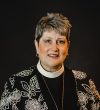- Communities across the ELCA are measuring congregational vitality in different ways through grants awarded by Lilly Endowment Inc.’s Thriving Congregations Initiative. Photos: Kristin Tangen
- The Minneapolis Area Synod received a Lilly grant for just under $1 million. The leaders of 13 participating congregations gather monthly as a cohort to share what they’re learning about what makes a congregation vital or thriving.
Imagine measuring congregational vitality by how alive people and faith communities feel in their gathering and in their interactions with their neighbors, instead of determining success by counting the number of people attending worship or the number of dollars collected.
That’s what congregations are doing, or learning to do, throughout the ELCA in programs funded through grants awarded by Lilly Endowment Inc.’s Thriving Congregations Initiative.
The success of the programs might look very different in various communities of faith, whether that means being more intentional about relating to families with children in day care or meeting neighbors because of a church cookout that blossoms into an informal car show.
St. Olaf College, Northfield Minn., is now working with 14 congregations in seven states and four denominations in a program centered in a spiritual practice called vocare, named after the Latin verb meaning “to call.”
The practice asks three questions:
- Who am I, or who are we, called to be?
- What am I, or what are we, called to do?
- Why are we here?
“We’ve invited congregations to walk with this spiritual practice, then think through these questions on an ongoing basis,” said Charlene Rachuy Cox, who leads St. Olaf’s Nourishing Vocation Project with a $1 million grant from the endowment. “Thriving congregations are made up of thriving people—that’s our hypothesis. So nurturing people in their lives to be attentive to God’s call means nurturing congregations. Then we can help congregations live through this spiritual practice in the same way.”
The project was designed around vocation because it’s a central question for a college of the ELCA.
“It’s a project of spiritual renewal to help congregations and individuals deepen relationship with God,” Cox said.
“It’s giving congregations permission to talk about and think about something different. The energy is pretty exciting.”
The hope is that the process of spiritual questioning will “lead to one discernible thing coming out of this” for each congregation, Cox said, but she’s not sure what that “one discernible thing” will look like for them.
When one of the congregations was asked why they decided to take part, “their response was [that] this was a process of spiritual renewal, and not a business model of doing one, two, three, four things and then your problems are solved,” she said.
The first cohort of five congregations that began the process found a deepening of storytelling among the group that created relationships, Cox said. Participants also learned that both rostered ministers and lay leaders are strapped for time in a world changed by the COVID-19 pandemic. “Their plates are full,” she added.
That caused St. Olaf to begin creating resources, such as Advent and Lenten studies, to take pressure off congregational leaders. Many of the studies were written by young adults, including St. Olaf students. “Because we’re a college, we live and breathe young adults, and we believe lifting up young adult voices is important for the sake of the whole church,” Cox said.
The process is redirecting congregational energy for leaders. “It’s the work of the Spirit,” she said. “There’s power that comes in storytelling. When’s the last time we had permission to say, ‘What do we value?’ and ‘What are the voices calling to us?’”
The process has also created what Cox calls “a good and healthy tension” between asking those questions and thinking about the numbers that usually define a congregation’s success. “This redirection of energy is proving to be very life-giving,” she said. “It’s giving congregations permission to talk about and think about something different. The energy is pretty exciting.”
St. Olaf began the first group with five ELCA congregations from Illinois, Texas and Minnesota. A second cohort has just started with nine congregations from Oklahoma, Ohio, North Carolina, South Dakota and Minnesota. Those congregations are Lutheran, Methodist, Presbyterian and United Church of Christ.
The college is expecting two more cohorts of 14 congregations.
Congregations can apply for the Nourishing Vocation Project.
Look for part two, exploring how a Lilly grant has impacted the Minneapolis Area Synod, next week.






